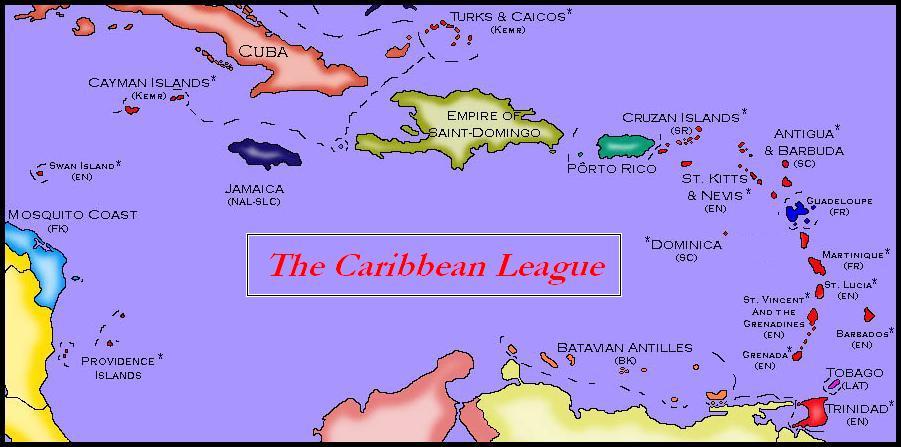Caribbean League
The Caribbean League is to be a new country comprised of Caribbean island territories and is to be modelled upon the North American League. The proposed national government will fill the power vacuum that was left with the dissolution of Florida-Caribbea in 2004; and will provide a national level infrastructure to deal with regional and international issues that affect the region. This government will fit into the larger Commonwealth of Nations community as a national entity, and will be able to focus more intently on the internal affairs of the Caribbean region while contributing and receiving from the larger economic entity. The proposed name for the nation-state would be the Caribbean League (CaL). This plan is not expected to reach fruition for the better part of a decade as the details of the agreement are resolved.
While only preliminary negotiations have been conducted, response has been favorable among the Commonwealth of Nations territories. The Batavian Antilles have received the overtures cooly, but seem at present to be warming to the idea. The French territories are also accepting of the unity. Very little response has been received from Porto Rico and the Cruzan Islands. This assessment, made by the stronger proponents of the new League, may be somewhat hasty and optimistic. None of the non-Commonwealth territories have made any firm decision regarding joining the CaL. Several territories, the French Overseas Departments in particular, would have to seek independence before being able to join up. The Batavian and Scandinavian territories would also have to seek rearrangements of their own colonial relationships before being able to join.
A proposal to invite South Florida was quickly and unanimously rejected by all involved parties in the initial talks. The French territories of Guadeloupe and Martinique are excited by the notion of increased local governance, with the promised support of the Commonwealth should a power similar to Florida-Caribbea arise again and threaten their sovereignty. The French government has been accepting of the condominium status, having researched the adherence of New Sweden in the NAL.
The military response for the Tobago-Occupation is in the forefront of nearly every minister's mind. Hopefully, the issue will be resolved peacefully, should Latvia agree to withdraw. Talks with the possibility of a condominium status are stalling, as England and the Tobagan Government in Exile are not interested. At present the prosepective member states have no native military organization to effect any response against the Latvian threat, or any other future threat. One can be reasonably sure that Latvia's idea of a peaceful outcome is not unilateral withdrawal. It has not been publicly discussed, but English ministers to the League of Nations are in the process of making formal charges against Latvia. It is hoped that the occupation can be sorted out without calling upon waiting warships surrounding the beleaguered island.
These topics are being discussed within the parliaments of the Federated Kingdoms and the NAL-SLC, as well as in regional assemblies across the Caribbean. Notable exclusions to the proposed country are Cuba, Porto Rico and the Empire of Saint-Domingo (the latter two of which did not respond to the proposal).
Proposed maps for the CaL
- Current Borders within the Caribbean
- Future Borders with the CaL-SLC (excludes NAL Territories)
- Future Borders with the CaL-SLC (includes NAL Territories)
- Most Probable Future Borders with the CaL-SLC
Re-Dressed Proposal
Following the failure of the initial proposal for unity the governments of the Caribbean islands continued to meet together. In November of 2007 a proposition was placed before the governing bodies of several major islands and was resoundingly accepted. In March of 2008, polling was held, and in June of 2008 the creation of the Caribbean League was announced.
Discussion continues as to the location of the capital. Charlotte-Amalie remains a prime choice, despite the nuclear damage from Florida-Caribbea.
Participating members of the newly formed nation-state are:
- Cayman Islands
- Swan Island
- Providence Island (condominium with Mosquito Coast, or possibly Central American Community)
- Turks and Caicos
- Cruzan Islands (condominium with Scandanavian Realm)
- Antigua and Barbuda
- St. Kitts and Nevis
- Dominica
- St. Lucia
- St. Vincent and the Grenadines
- Grenada
- Trinidad and Tobago (condominium with England)
Also accepted into the state by public referendum and grudging support from France, Martinique joined in July of 2008 as a condominium with France. A Tobagan government in exile has also pleaded for the nation state and the Commonwealth at large to ouster the Latvian junta despoiling their island home and admit them to membership. After the junta was ousted in 2008, they acceded to the new state as well. Guadeloupe joined in 2010 in a similar arrangement to the other condominiums. Talks have begun as of late to accede the Southern Floridian territories to the Caribbean league; whether or not this will actually happen remains to be seen, and the Erdekan occupational authorities in South-West Florida appear to be stubbornly committed to keeping their occupation zone under RTC administration.
